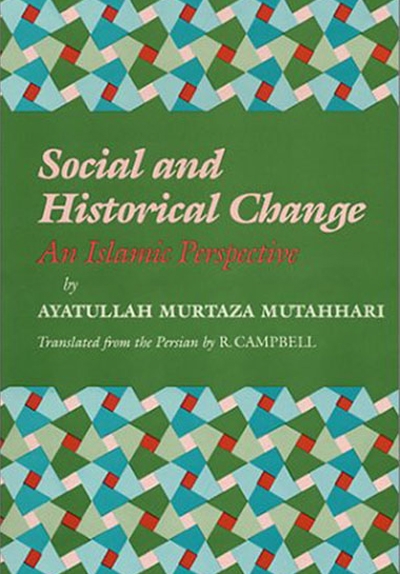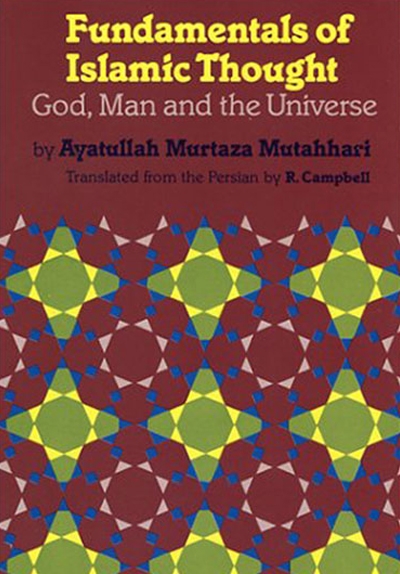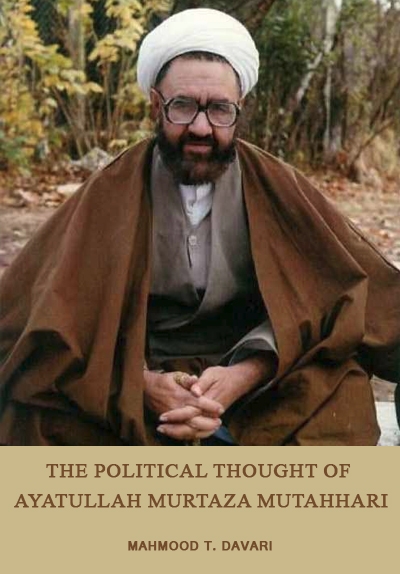Social and Historical Change: An Islamic Perspective

Author(s): Murtaza Mutahhari
Publisher: Mizan Press
Published on: Ramadan, 1406 1986-06
ISBN: 0-933782-18-7, 0-933782-19-5 (pbk.)
No. of Pages: viii + 164
Foreword
by Hamid Algar
The Islamic Revolution of Iran was preceded by important intellectual as well as political and social developments, and it might even be argued that the intellectual prehistory of the revolution has been crucial to the course it has taken. While an important segment of the religious scholars was awakening to a new sense of political commitment and social responsibility under the guidance of Imam Khomeini, certain secular intellectuals were attempting to evolve varieties of Islamic ideology that were attuned to their own preferences and influenced by Western modes of thought. Disputes and tensions arose between the two currents of thought, but they remained generally in the background until the overthrow of the Pahlavi regime. After the establishment of the Islamic Republic, however, these differences emerged as one of the factors hindering the stabilization of the new order and its institutions. The stability now enjoyed by the Islamic Republic, six years after the revolution, is an indication of the ideological as well as political triumph of the Islamic understanding propounded by the religious scholars, one based on a coherent and comprehensive view of the Qur’an and other authoritative sources.
Among the most important issues discussed in the ideological writings of the pre-revolutionary period are those dealt with in this volume, society and history: the nature of society and of societal change, the relationship of ideology to social and economic factors, determinism or accident as the prime characteristic of historical change, and so forth. The late Ayatullah Mutahhari was among those few persons who were able to delineate a coherent Islamic position on these subjects and to demonstrate the potentialities of Islam as a motive for revolution without falling into the glorification of revolution and making of it the supreme and exclusive goal of Islam.1
It has been well said that a whole world of differences separated “Islamic revolution” from “revolutionary Islam”; the former expression means a comprehensive process of transformation that is conducted in accordance with Islam but does not exhaust the entire content of Islam, whereas the latter means an Islam reduced to being the instrument of revolution and defined completely in terms of socio-economic processes.2 Mutahhari was the most articulate defender of “Islamic revolution” against the encroachments of “revolutionary Islam.”
One of the benefits of Mutahhari’s philosophical training and mode of thought was that it made him an excellent polemicist, in the best sense of the word. He took the opponent’s argument seriously and stated it as fully and coherently as possible (sometimes, indeed, more persuasively than the opponent himself) before proceeding to a reasoned and systematic refutation, in a language almost entirely devoid of anger or scorn. But it was in the nature of “revolutionary Islam” to spurn all reasoned debate and to override objections through the spectacular application of force. It was thus that Mutahhari attained the goal of martyrdom.
That the present book is in a sense a document of combat is confirmed by its abrupt ending; Mutahhari was assassinated before he was able to complete it. But the book should be read as more than a record of ideological struggles; it has lasting value as a statement of essential Islamic doctrine on the twin topics of society and history, and thus serves to complement perfectly the first volume of Mutahhari’s writings published by Mizan Press, Fundamentals of Islamic Thought.
—Hamid Algar
Notes
- For a biography and fuller analysis of the career of Mutahhari, see my introduction to Mutahhari, Fundamentals of Islamic Thought, Mizan Press: Berkeley, 1985, pp. 9-20.
- See Sayyid Husayn Ta’ib, Tahlili az Tirur-i Mutafakkir-i Shahid Ustad Mutahhari, Tehran, n.d., p. 2.


